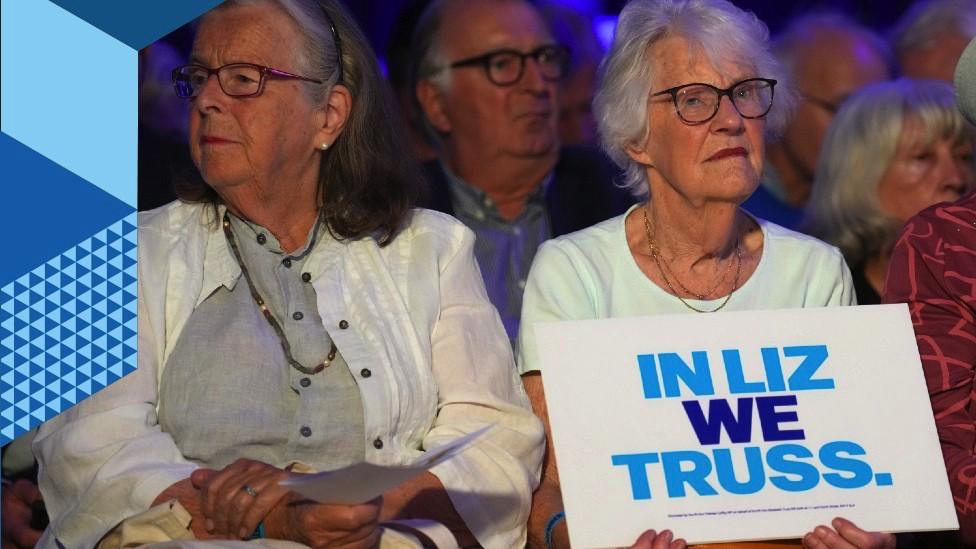Tory leadership: Rishi Sunak and Liz Truss in fiercest clash yet over tax
- Published
- comments
WATCH: Our Next Prime Minister - BBC debate highlights
Rishi Sunak and Liz Truss tore into each other over their rival visions for the future of the UK economy, in their first head-to-head TV debate.
The two contenders to be the next PM did not hold back from "blue-on-blue" attacks in the hour-long BBC special.
Mr Sunak told Ms Truss her tax cut plan would "tip millions of people into misery" and cost the Conservatives the next election.
Ms Truss said tax rises brought in by him would lead to a recession.
The foreign secretary and former chancellor, who until three weeks ago were in the same cabinet, talked over each other at times and shot angry glances across the stage at Stoke-on-Trent's Victoria Hall.
It led to complaints afterwards by Ms Truss's supporters that the ex-chancellor was being too aggressive and was "mansplaining" - something fiercely denied by the Sunak camp.
The pair were on better terms by the end of the debate, with Ms Truss saying she would "love" to have Mr Sunak on her team if she becomes PM. The ex-chancellor praised her stance on Russia.
But the row over tax dominated the early exchanges.
Ms Truss wants to scrap the rise to National Insurance, a planned rise in corporation tax and would temporarily scrap green levies on energy bills to be paid for through borrowing.
Mr Sunak says he would not cut taxes until inflation was under control.
Mr Sunak - who quit as chancellor earlier this month - said the coronavirus pandemic had created a large bill and that putting it on the "country's credit card" would "pass the tab to our children and grandchildren".
Watch: Sunak and Truss angrily debate borrowing and debt
Ms Truss insisted that under her plans the UK would start paying down the debt in three year's time - and paying it back straight away as Mr Sunak wanted to do would push the UK into a recession.
Mr Sunak suggested her plans would lead to higher interest rates, but the foreign secretary dismiss this as "scaremongering" and "project fear" - an echo of the criticism aimed at the Remain campaign during Brexit referendum.
Mr Sunak took this opportunity to point out that, unlike him, Ms Truss campaigned against Brexit.
"Maybe I learnt from that," she replied. She later said the Brexit referendum was when she had learnt not to trust Treasury forecasts on the economy.
Other key moments in the debate included:
Both candidates accusing the other of not having been tough enough on China in the past
Ms Truss contrasting her comprehensive school education with that of Mr Sunak's, who attended the fee-paying Winchester College
Mr Sunak said he was "not going to apologise" for his background, adding that his parents' aspirational values were Conservative - something that earned him the evening's first round of applause
Mr Sunak's resignation as chancellor helped trigger the downfall of Mr Johnson.
He praised Mr Johnson's handling of Brexit and the pandemic but said he had quit as a matter of principle over the PM's "conduct" and the fact that they had "very different views about the direction of travel on the economy".
Ms Truss acknowledged the prime minister had made mistakes but said they were not "sufficient" enough for the Conservative Party to have "rejected him".
Neither said they would accept Mr Johnson in their cabinet.
Chief secretary to the Treasury and Truss-backer Simon Clarke told BBC Breakfast that polling after the debate showed the majority of Conservative voters thought his candidate had won the evening - and it had reaffirmed his view that she was the right candidate to lead the country.
He refused to criticise Mr Sunak for interrupting, but said viewers would have to make up their own minds about his debating style. He added he thought Ms Truss had been "cool, controlled" and had made compelling arguments.
Labour leader Sir Keir Starmer told BBC Breakfast the debate showed a Conservative Party which had "lost the plot and lost its purpose".
He said Mr Sunak was acting like he had "just come down from the moon" and discovered the economy was in a bad way when he had been in charge of it until three weeks ago, while Ms Truss was playing "fantasy economics" without explaining how she would pay for tax cuts.
"We do need change in the UK but the change we need is not a change at the top of the Conservative Party, it is more fundamental than that. We need a fresh start for Britain. We need a Labour government," he said.
A Liberal Democrat spokesperson simply said: "Eurgh."


For all the talk of wanting the "blue-on-blue" attacks to subside - this debate showed they haven't gone away.
Liz Truss's campaign accused Rishi Sunak of not letting her get a word in edgeways, and Rishi Sunak continued to slam Liz Truss's tax cut plans for not being economically sound.
Sources close to Sunak said he had "won the argument" on the economy, with his argument that her tax cuts would further fuel inflation and push up interest rates and people's mortgages.
Behind the scenes, Truss's camp feel positive too - claiming that while she stayed calm Sunak was "flustered".
Debates about their backgrounds haven't gone away either. Both are keen to distance themselves from any suggestion they had certain privileges.
Truss pointed to her comprehensive school education but distanced herself slightly, though, from the outright attacks on Sunak's clothing and education from some of her supporters.
But the key battleground - and the biggest dividing line between the two - is still tax.


What questions do you have about the Tory Leadership debate? Please get in touch by emailing: haveyoursay@bbc.co.uk, external.
Please include a contact number if you are willing to speak to a BBC journalist. You can also get in touch in the following ways:
WhatsApp: +44 7756 165803, external
Tweet: @BBC_HaveYourSay, external
Or fill out the form below
Please read our terms & conditions and privacy policy
If you are reading this page and can't see the form you can email us at HaveYourSay@bbc.co.uk, external. Please include your name, age and location with any submission.
Related topics
- Published23 July 2022

- Published5 September 2022
